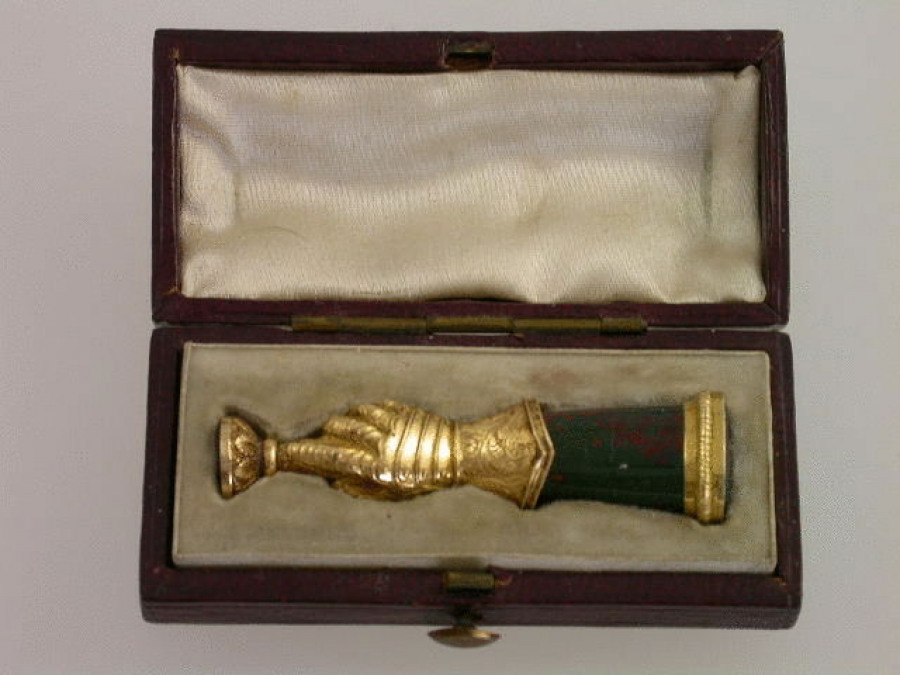


#GOLD SEAL MAKER REGISTRATION#
The Patent Office, defendant, contends that the mark is in fact deceptive and does mislead that such deception constitutes an absolute bar to registration regardless of what the Gold Seal Company intended, and regardless of whether or not any purchaser was injured that the Government cannot and should not approve the use of any mark which actually misrepresents the goods to which it is applied, and since the product involved contains no wax or any border-line substance which might be considered a wax, since the word "wax" has a reasonably definite meaning, and since the words Glass Wax on a container of a liquid recommended for use on glass indicates that the product contains a wax in material amounts, the mark is deceptive. Plaintiff further contends that should the Court find Glass Wax not a technical trade-mark, it should nevertheless register the mark in that it has acquired a *932 "distinctive" or "secondary meaning" under Section 2(f) of the Lanham Act, even though evidence of such distinctiveness was not considered by the Patent Office that it can and should be considered by this Court, the Patent Office having erroneously failed to do so and that no estoppel exists to prevent plaintiff from presenting registrability under Section 2(f) in this court. Plaintiff contends that Glass Wax is a "technical" trade-mark under Section 45 of the Lanham Act, it being a combination of words "adopted and used by a manufacturer or merchant to identify his goods and distinguish them from those manufactured or sold by others" that it is not deceptive, nor is it merely descriptive, in that Glass Wax describes both a cleaner for glass and a cleaner for metal that it is not merely deceptively misdescriptive in that it does not misdescribe a cleaner, a cleaner for glass, or a cleaner for metalware. Is the plaintiff, Gold Seal Company, entitled to have the words Glass Wax registered as a trade-mark for a "glass cleaner and polish" on the Principal Register under the Trade-Mark Act of 1946? In the interest of clarity, the two principal questions involved that of registrability and that of Johnson's counterclaims will be treated separately. Both of the Patent Office tribunals, however, denied registration of the mark, deciding that it was either merely descriptive or deceptively misdescriptive and refused to consider the application as one seeking registration based on secondary significance. The Examiner held the mark not deceptive, while the Commissioner found it unnecessary to determine this. The opinion of the Examiner of interferences, who heard the opposition, was filed on May 4, 1950, while the Decision of the Commissioner was filed on September 14, 1951. The fourth, filed by intervener Johnson, was the progenitor of the present controversy. Three were ultimately dismissed with prejudice. Four oppositions were filed against the application. This application was accepted and published on March 23, 1948. On December 16, 1947, plaintiff again filed an application to register the mark. Shortly thereafter plaintiff unsuccessfully invoked the provisions of the Trade-Mark Act of 1905 to obtain registration of the words (Gold Seal) Glass Wax.īetween 19 plaintiff's product met with significant commercial success. Plaintiff corporation adopted Glass Wax in September, 1945, as its mark for the product in question. Johnson & Son, Inc., has intervened, opposing the application for registration of this mark, seeking a declaratory judgment that the words Glass Wax do not constitute a lawful trade-mark, and counterclaiming for injunctive relief, profits and damages on the ground that the mark constitutes a false representation and description of the goods, thereby causing Johnson damage or the likelihood of damage.

Plaintiff Gold Seal Company seeks a decree authorizing the Commissioner of Patents to register as a lawful trademark the words Glass Wax, used by plaintiff in connection with its liquid composition for cleaning glass and metal. Greiveldinger, Racine, Wis., for Johnson Wax. Beveridge, Mead, Browne, Schuyler & Beveridge, Washington, D. C., Solicitor for Patent Office.įrancis C. White, Minneapolis, Minn., for plaintiff. (Johnston, Thompson, Raymond & Mayer, Chicago, Ill.), Paul, Moore & Dugger, Maurice M. United States District Court, District of Columbia. Sinclair WEEKS, Secretary of Commerce, and Robert C.


 0 kommentar(er)
0 kommentar(er)
